Green Roofs Benefits Heavily Outweigh the Costs for Urban Residents
Sourced from ZME Science
Cities around the world are starting to embrace green roofs as a way to improve water quality, reduce peak flows, and decrease stormwater runoff. Although their installation might involve high upfront costs compared to a regular roof, their benefits are appreciated by urban residents, who seem willing to pay the extra cost, a new study has found.
Green roofs have a layer of plants on top of the roof, which usually comes with a layer of soil, material for waterproofing, structural support, and insulation. They absorb rainwater by the water buffering in the plants, substrate, and drainage layer, which delays the discharge of rainwater to the sewage system and reduces the risk of flooding. The plants in the green roof also filter particulate matter from the air and absorb and reflect sunlight, which helps to reduce the heat island effect in cities. The roofs provide significant, quantifiable benefits, but also raise costs in terms of installation and maintenance.
Portland is a world leader in the use of green stormwater infrastructure such as green roofs — in 2020, the city had about 2,500 green street facilities, and the number has increased since. In a new study, researchers from Reed College wanted to better understand how much Portland residents were willing to pay to increase green roofs in the city.
“Countries are investing significant public resources to reduce the impact of stormwater runoff,” Amy Ando, study author, said in a statement. “Green roofs are part of that solution because they capture some of the rain that would otherwise end up in sewage systems. Knowing the benefits from investing in green roofs is important for implementing public policies.”




